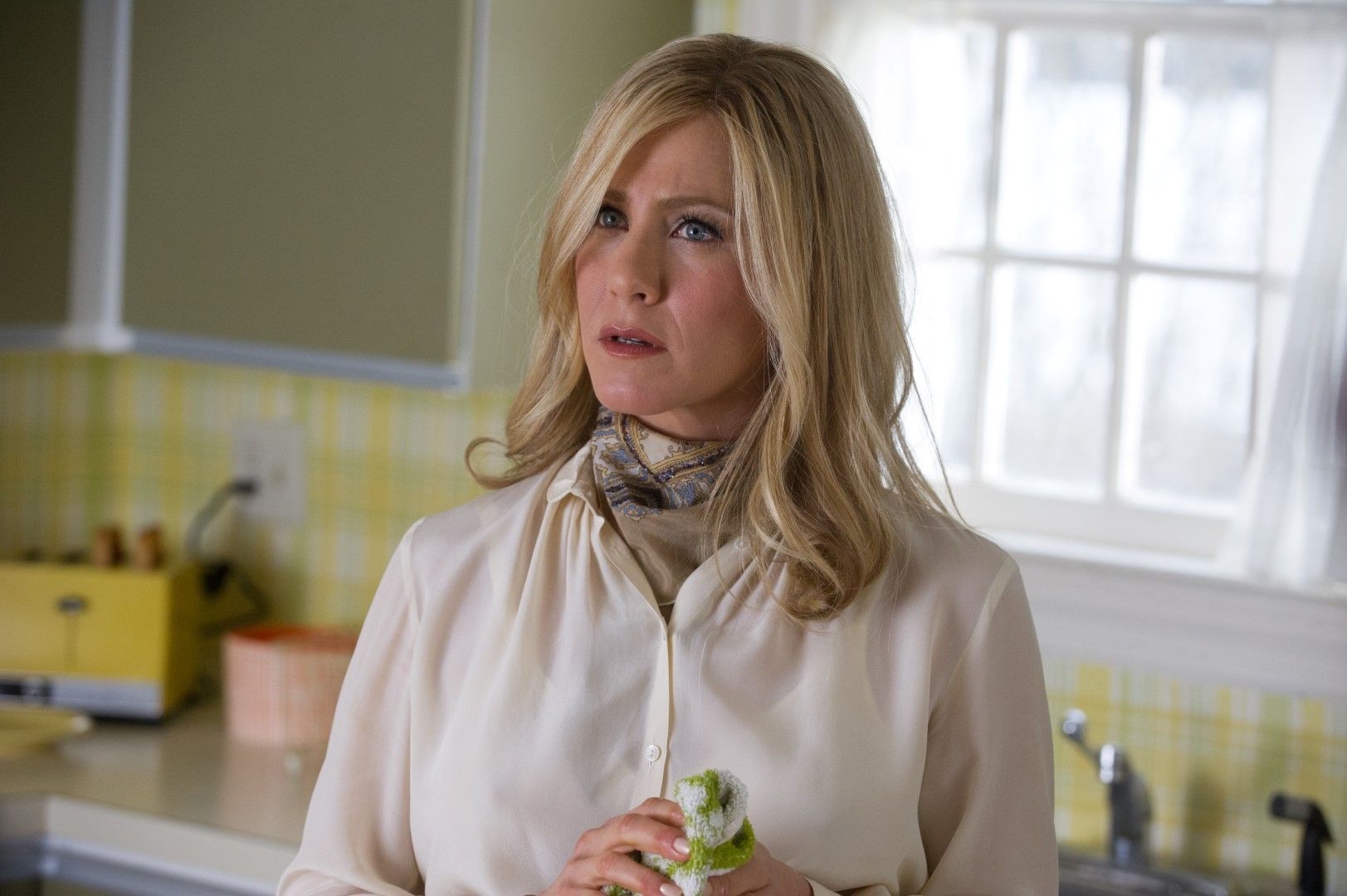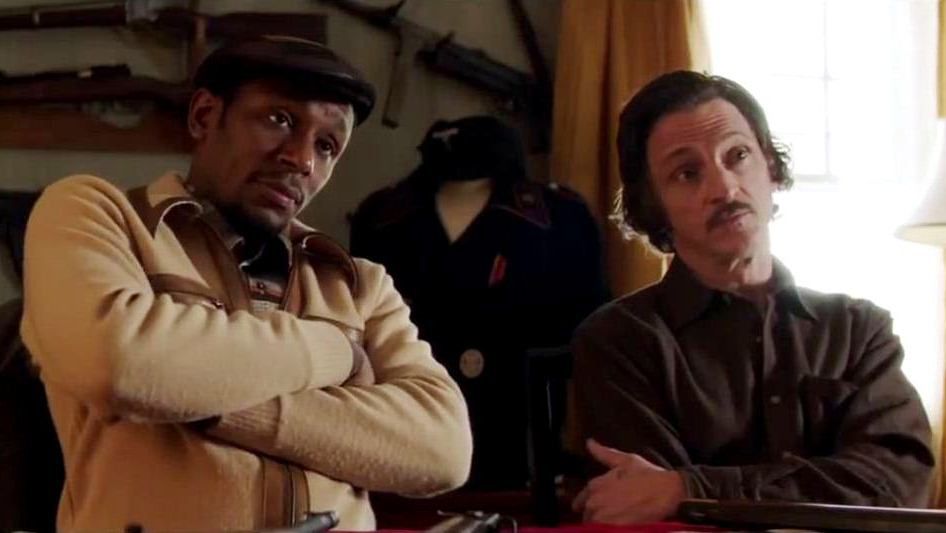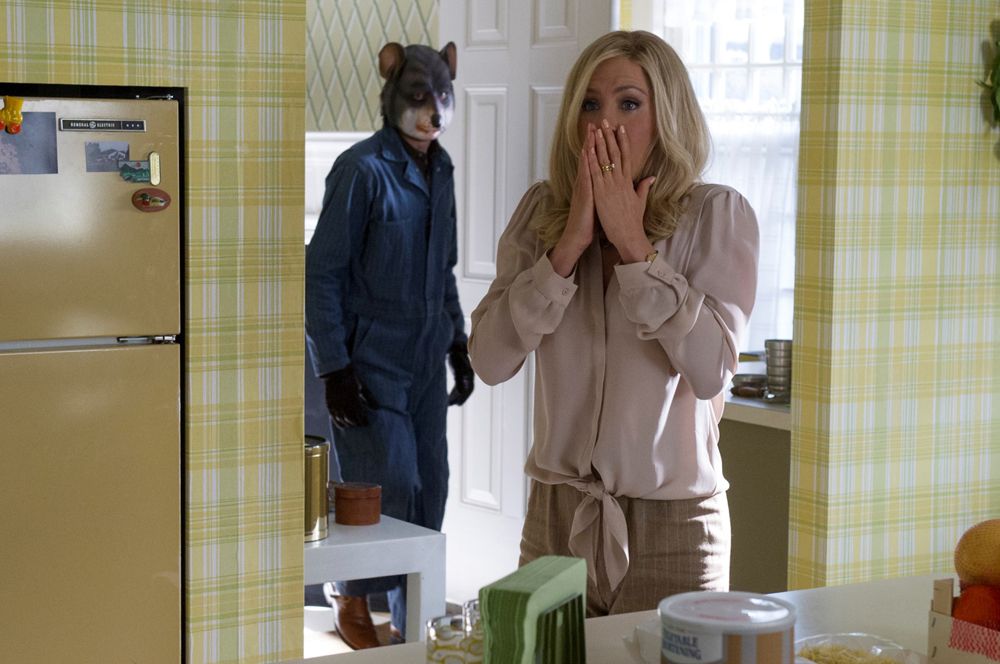If Ordell Robbie and Louis Gara, the not-quite-as-smooth-as-they-think kidnappers of the new comedy drama Life of Crime, seem familiar, that’s because you may have met them before, either on the page or on the screen.
Played in the film by Yasiin Bey (aka rapper Mos Def) and John Hawkes, Ordell and Louis were introduced in Elmore Leonard’s 1978 novel The Switch, which serves as the basis for writer/director Daniel Schecter’s Life of Crime (which also stars Jennifer Aniston, and was retitled to avoid confusion with her 2010 comedy The Switch). Leonard revisited the characters, along with the scheming Melanie Ralston (played in Schecter’s film by Isla Fisher) in his 1992 novel Rum Punch, adapted five years later by Quentin Tarantino as Jackie Brown, which cast Samuel L. Jackson, Robert DeNiro and Bridget Fonda as Ordell, Louis and Melanie, respectively.
Life of Crime intentionally taps into the alternately light and dark tone of the most Leonard-esque adaptations, like Out of Sight and Get Shorty. However, Hawkes admitted with embarrassment at a recent press event that he’s yet to see the film’s pitch-perfect precursor Jackie Brown.
“I'd heard of Robert DeNiro,” the Oscar nominee said straight-faced before chuckling. “No, I'm a huge, huge fan [of his], so it was wonderful to not to have to try to walk in his footsteps. I hadn't read any Elmore Leonard novels – I was more of a Raymond Chandler-Ross Macdonald [fan] with the kind of crime fiction – but I'd certainly heard of Elmore Leonard. I was really happy when I read The Switch, as far as how pointed it was as far as character study and things like that. I did not read Rum Punch in preparation. The script is the bible. Certainly the book was a pretty wonderful sidepiece to what we were trying to do.”
Set in gritty, ‘70s-era Detroit, Leonard’s preferred literary milieu, Life of Crime centers around Ordell and Louis’ fumbling attempt to kidnap and ransom Mickey Dawson (Aniston), a privileged, upper-class housewife achingly unhappy in her relationship with her callous and philandering husband Frank (Tim Robbins), who refuses to pay the ransom after being manipulated by his mistress Melanie. The plot is further complicated by Ordell and Louis’ untrustworthy accomplice, the Nazi memorabilia-collecting Richard (Sons of Anarchy’s Mark Boone Junior), and the Dawsons’ county club acquaintance Marshall (Will Forte), whose lust for Mickey puts him at the wrong place at the wrong time.
Adapting the author’s highly stylized and much-admired prose was no easy feat, Schechter admitted. “There definitely was angst because he was someone who I enormously admired, and he loved to publicly shit on the adaptations that he hated,” he said with a laugh. “And just personally, my goal is to be in the top group that he was proud of or held his head high about. So there was enormous self-pressure I had to please him.”
Leonard died in 2013 before he could weigh in with an opinion on the finished film, but Schechter found the voice of the author’s prose so strong, specific and evocative that, “to me, it was reading music – I could hear it in my head. “I'm like, ‘I really think I get the tone of this with every decision that these guys made,” he said. “And it was a tightrope that I really enjoyed.”
Schechter began by tinkering with a single scene from the novel and ultimately found himself with a complete first draft in just eight days. “It felt really adaptable and it felt like a movie when I was reading it,” he said. “It kind of felt like the epitome of what he does. It’s very sort of basic crime at the heart of it – the characters are what I find fascinating about the story. There were just certain roles that I wanted to see cast like a fan of it, like a Harry Potter fan who wanted to see all those great actors fills all those roles.”
When the script made its way to Aniston, she agreed not only to star in the project but also produce it, making it one of just a handful of movies she’s helped get made behind the scenes
“Dan just impressed me to no end and I was so excited because I’ve always loved Elmore Leonard,” she said. “I had read the book and I love how he writes his characters. They’re all so interesting and detailed, and his bad guys aren’t the brightest, yet they somehow always make it happen and they’re actually lovable. I also thought Mickey’s character had such a beautiful arc and a powerful one. In that time, to write that for a woman in the ‘70s, was pretty awesome. The whole package was really exciting for me. It was pretty much a no-brainer.”
Hawkes’ version of Louis is a little more relatable – even loveable – than the take DeNiro delivered. “I was most interested in the relationship between Mickey and Louis,” the actor said of the growing personal bond and protective feelings between the kidnapper and his captive. “There’s a scene where I suggested to Dan that maybe there could be a slight, almost move or slight touch of her where we begin to wonder if something might happen. … One thing I thought about with Louis was his grace through it all.”
“One of the main things that really attracted me to the book was how these men who had their own very selfish motives who sort of abandoned their own self-interests through lust for a beautiful woman,” Schechter said. “They sort of make these reckless decisions as the film goes on because either consciously or unconsciously these women are manipulating or controlling them. Women have to find power where they can find it in certain times throughout history. I think by this time it was I think 1978 and most women are probably a little further than Mickey.”
“Part of the pleasure of reading the book is when we meet Mickey, she's putting on the proverbial mask for the country club and her children and her husband,” the filmmaker continued. “And when she gets kidnapped she's like ‘Well, I don't have to put on airs for these jerks who kidnapped me. I can just see who I am and want to be in this situation.’ And she really seemed to find her voice.”
“Mickey was living in the petrified forest with Frank and very repressed emotionally and abused and didn’t know how to make a move to get out of that sort of jail,” Aniston agreed. “Oddly enough, the kidnapping is her Get Out of Jail Free card. As the story progressed and her situation became more dire, she found that strength like women do when faced with unimaginable circumstances. “
In the end, after crafting a film that could stand as both its own story and as an unofficial prequel of sorts, Schechter was tickled by the notion that audiences could follow Ordell and Louis further down the road. “The cool thing Elmore Leonard said was that when he wrote The Switch, he knew that one day, Louis or Ordell would kill the other, but he didn't know who would kill who. And 20 years later, he wrote Rum Punch.” He then gave spoiler-averse Hawkes a reassuring look. “I'm not going to say anything! I'm not going to say who!”
Opening today in select theaters, Life of Crime is also available on iTunes and VOD.



